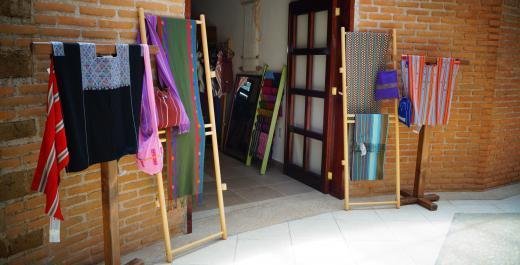SAN CRISTÓBAL DE LAS CASAS, Mexico (GPI)-- Celia Sánchez Ruíz, 46, learned to weave when she was 13 in the indigenous Tzotzil community, a Mayan ethnic group.
Celia Sánchez Ruíz, president of Cooperativa Jolom Mayaetik “To be an artisan, to be a weaver signifies tradition, the culture,” she says. “We wear our dress. I never have taken it off.” But she says that local interest in buying traditional clothing has been waning in Chiapas, Mexico’s southernmost state, threatening her culture. “In many municipalities, they no longer wear their dress or know how it was,” she says. “If it is lost, the tradition is not known anymore.” Initiatives to promote weaving have shaped her life, she says. In turn, she is working to preserve and develop this traditional craft. Sánchez, a mother of two sons, serves as the president of Cooperativa Jolom Mayaetik, a cooperative of indigenous women who weave and sell their products around the world. In the Tzotzil language, “Jolom Mayaetik” means “Those Who Do the Weaving.” By joining the cooperative in 1999, Sánchez became able to preserve her culture through weaving and to seek fair prices for her work by organizing with others. It also offered her the opportunity to learn new skills and to participate in a globalizing world. “When I arrived, I did not speak Spanish,” Sánchez says, referring to when she joined the cooperative. “I only knew how to answer, ‘Sí.’” She learned many things, she says, including how to use a computer, write checks and mail packages. She also got to travel. Sánchez, who grew up in the municipality of San Andrés Larráinzar, first moved to a different municipality, San Cristóbal de las Casas, where the cooperative is located and she lives today. Later, her work with the cooperative took her to other parts of Mexico and then the United States. Sánchez has now been president for six years. This role has taken her to the U.S. cities of Baltimore, Chicago, Los Angeles and New York to promote and sell the cooperative’s work. “Sometimes I get nervous because, what if I get lost?” she says. “But I return well. Before, I could not speak in front of people, but now not anymore.” Sánchez has 33 years of weaving experience that she contributes to her role of keeping the traditional craft alive. "It is very important to learn to weave because it signifies not losing our culture,” Sánchez says. “Because if we do not do our weaving, the culture is lost.” Weaving has long offered employment to indigenous women in Chiapas, but departure from traditional dress in recent years has hurt their sales locally. Cooperatives and other organizations are therefore enabling the craftswomen to develop new skills and to collaborate to market their goods internationally. The women are adopting innovative designs to express the evolution of their culture and to attract fresh customers. A new fair trade e-commerce platform may connect them with expanded markets so they can increase their sales and can preserve their indigenous culture. Indigenous people constitute 25 percent of the population in Chiapas, according to the state government. Altos de Chiapas, or the Chiapas Highlands, are home to large Tzotzil and Tzeltal populations, both Mayan ethnic groups. There are at least 300,000 artisans in Chiapas, and 60 percent are women, according to the Instituto de las Artesanías in its 2007 to 2012 plan. The state institute, now called Instituto Casa Chiapas, aims to revitalize, preserve and promote craftsmanship in Chiapas. In indigenous culture, girls learn to weave between ages 8 and 10 from their mothers, Sánchez says. Weaving offers a form of employment for women.















